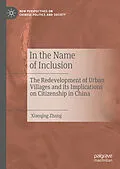This book follows the citizenship-based approach and interrogates the policies on urban village redevelopment from a perspective of social exclusion and inclusion. It focuses on two questions: how policy makers and urban villagers understand social inclusion differently, and what makes a difference in enhancing social inclusion. Firstly, an examination of citizenship conceptions, as reflected in the Chinese traditional discourses, provides the basis for questioning the political rhetoric of social inclusion in China. Secondly, a comparison between policy makers' and villages' interpretations on urban citizenship helps explore the different understandings of citizenship between them. Finally, by studying six redeveloped urban villages in the city of Xi'an, the book identifies what villagers strive for, and discusses how their strivings make a difference in achieving social inclusion during urban village redevelopment.
Xiaoqing Zhang is Lecturer in Public Administration at the Zhejiang Sci-tech University, China. She graduated from University College London with a PhD in Planning Studies. Her research interests include urban regeneration in relation to welfare regimes, and community governance sitting within a broader understanding of local political resources.
Autorentext
Xiaoqing Zhang is Lecturer in Public Administration at the Zhejiang Sci-tech University, China. She graduated from University College London with a PhD in Planning Studies. Her research interests include urban regeneration in relation to welfare regimes, and community governance sitting within a broader understanding of local political resources.
Inhalt
Chapter 1 Urban Village Redevelopment: The Paradox of Social Inclusion1.1 Introduction
1.2 Urban Village and its Development in Xi'an
1.2.1 Making sense of the urban village in China
1.2.2 Taking Xi'an as the case study city
1.3 Urban Village Redevelopment: From Exclusion to Inclusion
1.3.1 Urban village and inclusion
1.3.2 Citizenship: an alternative approach beyond economic dimension
1.4 The Paradox of Social Inclusion: Some Clarifications
1.5 Research Methods
1.5.1 Selection of study cases
1.5.2 Interviewing
1.5.3 Questionnaires
1.6 Plan of the Book
This chapter explains why the urban village redevelopment in Xi'an is worthy
of study and justified the use of citizenship as the key concept to study social
exclusion and inclusion.
Chapter 2 From Social Exclusion to Social Inclusion: Where does
Citizenship Fit in?
2.1 Introduction: A Short History of Concept Evolvement
2.2 The Meanings of Social Exclusion
2.2.1 Definitions: who, what, and how
2.2.2 Social exclusion in China
2.3 The Meanings of Citizenship
2.3.1 Citizenship as a Western conception
2.3.2 Theorising Chinese citizenship
2.4 From Exclusion to Inclusion2.4.1 The importance of citizenship
2.4.2 The importance of sense of inclusion
2.5 Conclusion: The Theoretical Framework
This Chapter discusses how the concepts of social exclusion/inclusion and
citizenship can be adapted in China, and where citizenship fits in the
discourse of inclusion. Social exclusion in China is more than a matter of
economic disadvantages but is also an expression of incomplete citizenship
and rights deprivation. The interpretation of Chinese citizenship can be
explored in four aspects: first, citizenship as membership is closely related to
the household registration system in China; second, citizenship as rights and
obligations in China incorporates a strong sense of Confucianism; third,
citizenship as identity closely links to an individual's sense of inclusion;
fourthly, citizenship as the process of right extension is an emerging focus.
The four aspects also provide the analytical framework for the following
chapters.
Chapter 3. Government's Understanding of Social Inclusion
3.1 Introduction
3.2 From Buildings to People: What is Inclusion?3.3 Citizenship as Membership: Gongmin, Renmin, Jumin, or Shimin?
3.4 Citizenship as Rights, or as Compensation?
3.5 Citizenship as the Process of Struggle for Rights, or as Benevolence?
3.6 Conclusion
This chapter explores how the notion of social inclusion is understood by the
Xi'an government and its implication on citizenship as membership, as rights,and as the process of struggle for rights. Influenced by the Chinese traditional
philosophies, the local government's interpretation on inclusion mainly focus
on urban membership with associated social benefits, and villagers are
considered as passive actors who receive benefits out of governors'
benevolence. This interpretation implies a trade-off, by which villagers are
made to compromise on property rights in exchange for social rights.
Chapter 4. Villagers' Understanding of Social Inclusion
4.1 Introduction
4.2 Being Urban Citizen: A Socioeconomic Comparison
4.2.1 Financial status of urban villagers
4.2.2 Living environments and housing facilities
4.2.3 Urban standards? Look at what we had before redevelopments
4.3 Citizenship as Identity: Urbanite, Farmer, Somewhere in between
4.4 Being Urban Citizen: What the Villagers Strive for?
4.5 Conclusion
This chapter explores how the notion of inclusion is understood by the
villagers in terms of citizenship as identity and as the process of struggle for
